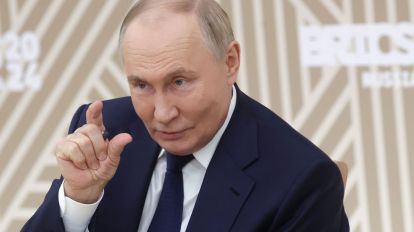Faced with a barrage of Western sanctions, analysts said Russia would hope to make some ground in Kazan to push for an alternative payments system.
According to Reuters, Russia planned to pitch the development of a network of national commercial banks linked to each other through the Brics central banks, removing the need to exchange local currencies through the US dollar.
Among other things, Moscow also has plans to set up a Brics reinsurance company to allow uninterrupted shipment of goods and key commodities between member countries if Western reinsurance firms refuse to offer their services.
Why Russia wants to win Brics friends for a new global financial order
As this year’s summit host, Moscow will be looking for a way around the US dollar-dominated international payments system
Two dozen leaders from emerging economies are gathering in the southwestern Russian city of Kazan next week to discuss political, economic and security cooperation. In the first of a two-part series, Dewey Sim examines Moscow’s desire for a substitute for the Western-led financial system.
Leaders from 24 countries including China and Iran will meet in the Russian city of Kazan from Tuesday for their first meeting of the bloc since it expanded this year to include Egypt, Ethiopia, Iran, Saudi Arabia and the United Arab Emirates. Brazil, Russia, India, China and South Africa are its founding members.
Jiang Tianjiao, associate director of the Centre for Brics Studies at Fudan University, said much global attention was on the upcoming summit particularly with Russia – chair of the group this year – in the middle of a heightened geopolitical environment.
“[The world] wants to know … if they can find consensus and make cooperative achievements,” Jiang said.
“With the Brics expansion, [the group now has] more members, bigger markets, and a huge population. All of these will bring great benefits and opportunities for trade and investment ... That’s why [countries] have very high expectations.”
He said Brics offered an “alternative narrative” that might appeal to countries in Asia, Africa and Latin America looking to distance themselves from Western countries. . ."
While each Brics economy has its own goals at the summit, Patrick said one thing that united them was the belief that the structures that governed international order and global economy today were “unfairly weighted” towards the Western world.
“Brics is an effort to challenge this embedded hierarchy, including the entrenched role of the US dollar and the weight that Western nations continue to enjoy in major international institutions, from the Bretton Woods institutions to the UN Security Council,” he said.
“For China, as for Russia, the hope is that Brics plus will be a vehicle to challenge the Western-dominated international order and particularly the dominance of the United States,” he added, referring to the expanded grouping.
With its expansion, Brics covers over 40 per cent of the world population and accounts for over a quarter of global GDP.
Vasily Kashin, senior research fellow at the Centre for Comprehensive European and International Studies think tank in Moscow, suggested that Brics was not an anti-Western institution, pointing out that some member states including Egypt and the United Arab Emirates were close allies of the United States.
Brics was more of a “club of countries that have a set of common interests related to economic development and global governance”, he said.
“That includes, for example, increased representation of non-Western countries in international institutions and limiting US ability to abuse its role in the international financial system to achieve short-term political and economic goals,” he said.
We just need to reduce the danger of secondary sanctions. Other Brics countries are interested in this kind of effort even if they are on good terms with the US
LINK >> South China Morning Post
BRICS to become alternative to global financial institutes
"BRICS plays an important role in the international economic order, providing a balance regarding large powers that not always work in the interests of developing countries. BRICS countries have common interests and huge possibilities for foreign trade," he said.
BRICS may "become an alternative to international financial institutes, such as the World Bank or the International Monetary Fund, as some largest economies of the world are among its members," Guzman noted.
- The Cuban foreign ministry said in October that the country’s authorities had submitted an official request to be included in BRICS as a partner country in a message to Russian President Vladimir Putin.







No comments:
Post a Comment